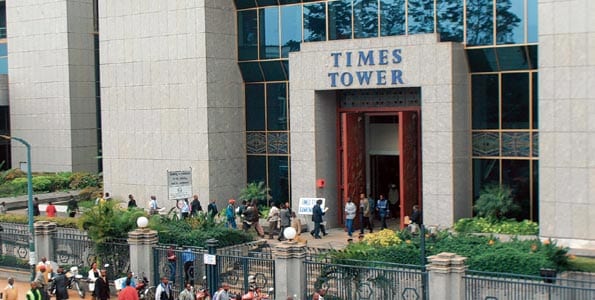[ad_1]
Counties
Farmers in Nyandarua build retirement nests on Bamboo
Monday, May 20, 2019 18:49
By WAIKWA MAINA

Giant bamboos are entrenching themselves as the third cash crop in Nyandarua, a region dominated by Irish potato and dairy farming after the collapse of pyrethrum industry.
Bamboo, which matures in four to five years, was first introduced to small-scale growers in 2017 but has since attracted the attention of large-scale farmers, professionals and the well-off urbanite.
Some professionals with limited land have formed companies through which they have ventured into bamboo farming, terming it a retirement scheme.
The biggest casualty of the bamboo is eucalyptus trees planted for commercial purposes that are getting uprooted to pave the way for bamboo.
At President Uhuru Kenyatta family’s farm in Kinangop, the workers are busy preparing and planting the seedlings in a 400-acre land. The land was previously occupied by eucalyptuses that uprooted last year.
At Uhuru Village, Mirangine Sub-County, workers are busy at Tom Kahigo’s farm, a lecturer at Kenyatta University preparing two acres for planting, in addition to four acres already flourishing with the grass. The farm manager Zacharia Njoroge says his employer shifted to bamboo last year after years of unrewarding Irish potato.
Pioneer farmers are now in code-two generation, which simply means marking the stalks in a different colour for easy identification during harvesting. In the current coding, white stands for first-generation stalks while yellow represents a second generation.
“We planted potatoes in the eight-acre farm, each earning us Sh40,000 in profit annually. Costs of production are becoming increasingly prohibitive with unreliable markets,” says Mr Njoroge. Among professional entities formed to venture in bamboo as a retirement scheme is Special Purpose Vehicle (SPV) which last year planted a 100-acre land, targeting to increase to 1,000 acres by next year and to 3,000 acres by 2021.
Elsewhere Gabriel Karume, an engineering graduate from Mombasa Technical Institute retired from Flourspar Company in 2007 as a machine shop supervisor, with plans to invest in horticultural farming at his three-acre farm at Ngorika village.
“I tried my hand in dairy farming, kales, cabbages, potato, and other horticultural crops, investing all retirement benefits until I was broke. But I have hope in the bamboo; it is now my retirement scheme,” said Mr Karume.
He revealed that more farmers are lured to the crop by contracts guaranteeing forty-year annual minimum returns.
Mr Karume planted 195 plants in a three-quarter acres, now blossoming, though he lost about 50 due to poor agronomy practices. “I inter-cropped the trees with oat, which grew taller than the bamboo killing the 50 seedlings. I have now learnt my lessons. I am replacing the 50 plants. I am a contracted grower,” said Mr Karume who has signed a new contract for the two acres.
Other prominent persons growing the bamboo are Nyandarua Governor Francis Kimemia with 20 acres and his deputy Cecilia Mbuthia on over 10 acres. The contract between the promoters Nawiri Kenya Ltd, GreenPot Enterprises Kenya and the farmer guarantees the grower Sh10,000 a tonne. Nawiri chief executive officer John Ndegwa says an acre of the giant bamboo produces ten tonnes annually, translating to Sh400,000 per acre.
But growers complain of the capital with Mr Ndegwa admitting investment capital is a challenge to many small farmers.
However, GreenPot Enterprises Kenya and the County government have partnered with Tower Sacco to finance growers. Tower Sacco Vice Chairman Benson Chege says all a farmer requires is an agreement with GreenPot Investment on the number of trees they are planting to get the funding.
“Farmers have embraced the package, we have funded hundreds of growers as individuals and as partners; we did own research and established it’s a viable, promising and a long-term rewarding venture,” says Mr Chege.
Ms Carol Kariuki, GreenPot chief executive officer says a farmer needs Sh50,000 for the seedlings at Sh200 per plant, and at least Sh10,000 for annual crop management, making a total investment of Sh80,000 to harvesting.
An acre holds between 250 and 260 bamboo plants, at a spacing of four squared metres. Other related costs include ploughing, manure application and labour at between Sh10,000 and Sh20,000 an acre.
On market guarantee, Mr Ndegwa says they are guided by three concepts developed after local and international researches on bamboo farming—products, forest cover and demand for wood products.
“We are looking at the full value chain, from production to market. To guarantee the farmer of the Sh10,000 per tonne it means we have to do value addition which you can only do with a factory. We are targeting three main sectors of the economy,” notes Mr Ndegwa.
The three are energy, wood, and textile industry. In the energy sector, the marketers will be targeting carbonated charcoal where main customers will be from informal sectors and settlements, briquettes for schools, tea factories and other major wood fuel consumers.
The promoters are also targeting Kenya Power and Lighting Company in biomass production of electricity. On forest cover products, they plan to develop tiles; furniture’s ceiling boards, and interior beautification.
“On textile industry, we all know that bamboo cloth is classified as an intelligent fabric. It’s so-called because of its ability to lower or increase your body temperature by four degrees Celsius in the positive or negative depending on weather conditions,” says Mr Ndegwa.
He adds that wood products will always be on demand with diminishing forest cover, which recently led to the ban of tree harvesting in public forests by the government.
“The ban was imposed for one reason, that we do not have enough forest cover, yet demand for forest increase by the day. The advantage with bamboo is harvesting comes every four to five months, continuously harvesting from the same stool for forty years,” said Mr Ndegwa.
[ad_2]
Source link
Kenyan Business Feed is the top Kenyan Business Blog. We share news from Kenya and across the region. To contact us with any alert, please email us to [email protected]











